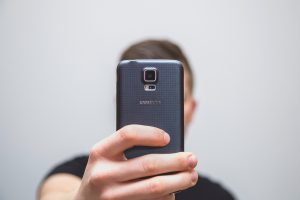
By Dr David Houghton, Lecturer in Marketing at Birmingham Business School
A few weeks back I was approached to write this blog piece on the topic of selfie culture, shortly after having appeared on BBC Breakfast discussing a similar topic. My first thoughts were, “what’s interesting about selfies?” I mean, we know from prior research, as well as our own common sense that taking photographs of yourself is an inherently egotistical and somewhat narcissistic act. The newly developed noun “selfie” even suggests that. That members of the public now more often ask actors and stand-up comedians for a selfie instead of an autograph, only indicates the take up of arms-length photography to show off to others just who that self has met. Even the likes of Ed Miliband had a selfie campaign imposed upon him by the #Milifandom during the 2015 UK General Election, not to mention the wider social media mess witnessed during Brexit and the recent US Presidential Election.
Then I thought, “why do people take selfies?” Again, we know this. They are fun, they are an easy opportunity to create a desired and controlled representation of our self that we can post to others through various personal and social platforms. What, then, shall be the point in this commentary?
Just this morning I was watching Stewart Lee on the BBC’s This Week. Often with exceptionally insightful and well-crafted delivery, Lee suggested of modern politics that we are “going down a wormhole”. We can debate this as much as we like, but in short, I think he’s on to something; we may have a tendency to ignore information from those we may dislike, but to do so is somewhat narrow minded. We should be listening to politicians whose views we dislike, otherwise we only reinforce our existing views, failing to recognise where wider debate and self-education can actually help us in understanding our surroundings.
This made me think about a similar phenomenon I see more widely online. For a while now, platforms such as Facebook, Twitter, Instagram and the like have been refining their algorithms for the spread of posted and shared content – something Lee touched upon during his appearance on This Week. As a marketing academic I find this to be potentially useful in making sure that specific consumers receive the information intended for them – information that is increasingly finely targeted. But Lee’s comments have relevance for wider culture.
Before appearing on BBC Breakfast I was asked, “what’s the solution to selfies?” This seemed a strange thing to ask. A solution requires there to be a problem, and I don’t see one with selfies themselves. If individuals wish to express themselves in this way, then so be it. There are obvious risks in the revelation of one’s self online, regardless of medium or format. But there are also benefits to individual and social expression, selectively controlling the self that we present, presenting a desirable impression or reaching out to similar others.
However, as this strange line of questioning played on my mind, I arrived at a different predicament. It’s not that selfies are a problem, but actually, the self. The self that views them. That is, our lack of desire to look beyond the selfie is the problem. Should we embrace the selfie? Yes, why not? You could argue it’s self-centred, narcissistic and fake, but it’s not hurting. Should we embrace what’s beyond the selfie? Definitely. To do otherwise, focusing only on the what is presented to us – by increasingly sophisticated, finely targeted algorithms; and our own confirmation bias – is nuts.
The selfie, then, is just a means to express, but is presented as the downfall of society by media outlets that are happy to jump on the bandwagon if it helps their story. The more interesting point, is that the problem is not the selfie, it’s the self. The one receiving the information, reliant only on platforms they ‘trust’ to present information in which they’re interested. The same platforms whereby fake news bounces around the echo chamber.
I see this in younger generations as they come through our ranks. If it’s not on the first page of a Google search within a few seconds, it does not exist. So, no. Technology is not the problem. Selfies are not the problem. The problem originates from the organic bit sat in front of the screen that needs to engage with things beyond its immediate exposure, or its platform or newspaper of choice. It’s the squishy bit that wants every thing now, but in reality gets the same thing now. As Lee suggested, we should be looking outside our field of vision to make sure we take the other information into account; to learn.
Education is not about confirmation, it’s about disconfirmation and processing. That’s something we shouldn’t forget too easily.

Agree, can’t we say rather than taking an autograph and saying that I met a celebrity, millennials use their electronic gadgets to express the moment saying they lived that moment. The very same intention, you meet your peers and brag about meeting the person you like.
Talking about going down the worm hole, well mellennials at least have the accepted the fact that the earth is warming up, they are more accepting in nature than every other generation prior to them. So it is debatable.